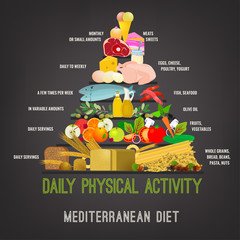Various epidemiological studies have found lower blood levels or intakes of some micronutrients, such as vitamins or minerals, in patients with depression compared to healthy subjects, specifically in the levels of vitamins of group B and vitamin D or in the levels of magnesium, calcium or zinc. This is how Almudena Sánchez-Villegas explains it, Professor of Preventive Medicine and Public Health at the University of Las Palmas de Gran Canaria, who is going to give her conference On her Healthy eating reduces the risk of depression inaugurate the XXI National Congress of Psychiatry, this week in Granada.
To this list, Gabriel Selva, a specialist in Psychiatry at the Center for Biomedical Research in the Mental Health Network (Cibersam), adds another nutrient: “the deficit of omega-three fatty acids in the diet can also contribute to the appearance of depressive symptoms.”
Regarding other nutrients, says this psychiatrist, “here is solid evidence that adherence to the Mediterranean diet, with a high intake of fruits, vegetables, nuts and low in processed meats, has a protective effect on depression. Coffee consumption seems to have a beneficial effect in its prevention.”
How does a lack of vitamin D affect mood?
Specifically, “some studies have shown that low vitamin D levels may be associated with the appearance of a greater number of depressive and anxiety symptoms, although not with severe depressive disorders. In addition, having adequate levels of this vitamin would help maintain intellectual functions in older people.
Vitamin D is synthesised for the most part in our body by the action of the sun on the skin and, to a lesser extent, by the contribution of a few foods. This means that its blood levels are lower during the winter months, and its deficiency is expected to be found more frequently in countries with few hours of sunshine.
Although there is evidence that vitamin D supplementation can be accompanied by a greater degree of well-being,” today there are insufficient data to support the efficacy of vitamin D in the treatment of depression when the disease is already established,” warns the Cibersam researcher.
Would the deficit of certain vitamins increase the risk of depression? “although there seem to be certain nutritional deficiencies in patients with depression, most of the studies that have been carried out have not assessed the effect of the deficiency in these nutrients on the risk of depression (on the probability that depression will occur). It is difficult, therefore, to determine whether the micronutrient deficit leads to depression or whether it is the depressive state itself that is responsible for the existence of poor eating habits and an inadequate intake of micronutrients,” explains Sánchez-Villegas.
In their research group, they assessed whether the presence of nutritional inadequacy in at least four micronutrients (that is, if nutritional recommendations were not followed in at least four vitamins or minerals) was associated with developing long-term depression. “the results, published in the latest issue of the European Journal of Nutrition, indicated that study subjects who did not meet nutritional recommendations for at least four minerals or vitamins had a 37 per cent higher risk of depression than those who they found normal intake values and within the established dietary recommendations” says the professor.
Selva explains that vitamin D has been shown to play a role in the regulation of serotonin in the brain. “his neurotransmitter is one of the main ones involved in the appearance of depression symptoms, especially major depressive disorder, also in depressive disorders that appear seasonally, that is, repeatedly at specific times of the year; as well as in premenstrual syndrome, those emotional manifestations that certain women suffer the days before menstruation.
Given that this last syndrome is specific to women and that depression, in general, is twice as common in women as in men, vitamin D deficiencies are more relevant in women. In addition, other times of risk for the appearance of depression in women are pregnancy and, above all, after childbirth. In these cases, it has been shown that the lack of this vitamin can be a factor that aggravates depressive symptoms.
Despite these data, acknowledges the researcher, recent studies on women have not been able to demonstrate the usefulness of vitamin D supplements during the winter
months in improving symptoms of depression, “o there is no scientific evidence to support its usefulness as a treatment.”
What about omega 3s?
“the intake of omega-three fatty acids present in nuts and fish has been associated with a lower risk of depression, but the results are inconclusive. Although the functioning and structure of the central nervous system depend on these fatty acids and the activity of vitamins, minerals and trace elements, a broader approach is needed in studying the aetiology of depression, where global patterns are investigated. Food and not specific nutrients,” says Sánchez-Villegas. As a result, some nutrients can interact with each other, so it is complex to establish the real role of a specific nutrient intake on depression. For example, the professor of Preventive Medicine and Public Health indicates that it does seem clearer, and there is consistency between various rigorously designed epidemiological studies, “he protective effect that global healthy eating patterns (and which of course ensure nutritional requirements in vitamins, minerals and omega three fatty acids) have on depression.”
Recommendations to raise the levels of these nutrients
“the recommendation that should be made to improve the intake of the nutrients as mentioned above, in general, and reduce the risk of depression, in particular, is to follow a healthy diet pattern rich in fruits, vegetables, nuts, and legumes. It is also necessary to reduce the intake of ultra-processed foods, such as industrial pastries, pre-cooked meals or processed meat, and replace refined carbohydrates (bread, pasta and rice) with whole-grain products. For example, red meat with lean meat and fish,” advises Sánchez. -Villegas.
The expert concludes by transmitting that there is more scientific evidence and eating patterns have greater value from the point of view of Public Health than vitamins or minerals in particular.


